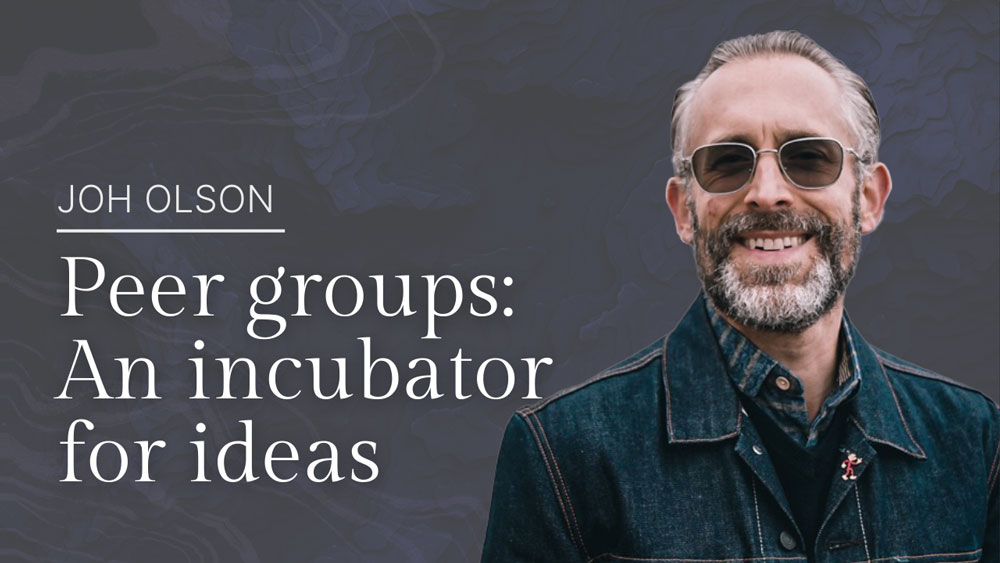Parker Johnson
5
min read
Peer Groups: An Incubator For Ideas
Joh Olson
COO/CEO/Advisor | Healthcare Mergers and Acquisitions (Middle Market), Tiger 21 Chair | San Francisco/Bay Area Chapter
Key Highlights
The Power of Peer Groups: Amidst the societal isolation intensified by the pandemic, peer groups have emerged as vital tools for personal and professional development, bridging gaps and providing unique insights through shared experiences.
Joh Olson's Peer Group Advocacy: Drawing from his diverse entrepreneurial journey and role at TIGER 21, Olson exemplifies the profound influence and benefits of engaging in these groups, especially in the pursuit of generational wealth.
Beyond Blind Spots: Peer groups prioritize experiential sharing over generic advice, illuminating unforeseen challenges and transforming theoretical risks into actionable insights.
Who Is Joh Olson, and Why Are Peer Groups So Influential?
Peer groups are a surprisingly unknown resource that can substantially impact personal and professional development. Joh Olson openly shares peer groups' immense impact on his career, personal life, and the societal void they fill. The pattern that emerges throughout Joh’s professional and personal history is that he builds his wealth synergistically with others. At every junction, Joh asks himself, “What does the team need from me?”
Filling the Societal Void with Peer Groups
Despite initial perceptions of peer groups as elite conclaves, they are accessible and valuable to everyone. They have bridged gaps, especially in a post-pandemic world where authentic leadership was compromised due to virtual constraints. Peer groups counteract these effects by fostering rich interactions and shared learning.
However, there is a peer group for everyone.
All professionals need to develop trusting relationships, build dependable places to bring ideas and find spaces where we can foster a sense of belonging. Peer groups fill this massive void in society by creating incubators for ideas.
In addition to the obvious negative impact of the pandemic, the loss of authentic leadership was a subtle yet significant loss for many organizations. Authentic leadership combines many factors that make up an individual’s experiences. Due to COVID, authentic leadership decreased significantly because many of the necessary factors were non-existent in a virtual environment, according to Chen and Sriphon (2021). The lack of authentic leadership created by the pandemic limits multi-source feedback, which inhibits leaders’ self-awareness. Following the pandemic, virtual working arrangements have become increasingly popular, exacerbating the effects. By their very nature, peer groups directly oppose these deleterious effects by encouraging input.
Path to Peer Groups: Joh’s Journey
Peer groups serve as unique congregations of professionals at comparable career stages, each with a distinct trajectory. Joh's journey to the helm of the San Francisco 05 chapter of TIGER 21 exemplifies such variety.
Joh's diverse background began in healthcare, transitioning from an operating room nurse to leading procedural teams at Stanford Healthcare. His healthcare career culminated in two monumental projects—aiding the construction of two new hospitals—a feat many might deem the pinnacle of a successful career. However, for Joh, this merely marked the inauguration of his entrepreneurial voyage.
Championing the American Dream, Joh perceives the pursuit of this dream not as a media-inflated ideal but as a testament to bravery. For him, the very journey toward success epitomizes courage, especially when underpinned by the freedoms of the corporate framework.
Entrepreneurial ventures emerged when Joh and his wife pioneered an e-commerce business. Initially envisioned as a supplementary venture, it swiftly evolved into a primary enterprise, leading Joh to assume the role of COO. Capitalizing on the venture's success, the duo ventured into the challenging Bay Area real estate market, albeit with mixed results.
Venture capitalism beckoned as Joh collaborated with Mighty Capital and Alix VC. Leveraging his healthcare expertise, Joh invested in a healthcare-centric software company, assisting in its growth and revelling in the impactful difference it made.
The transformative power of family became evident when Joh's first son was born. This pivotal moment redirected his ambitions towards crafting multi-generational wealth—a vision where peer groups emerged as invaluable assets.
Never Be the Smartest Person in the Room
Joh debunks a myth: wealth doesn’t guarantee success. Instead, real success lies in sustainable, generational wealth. Within TIGER 21, it's evident that it isn't merely about financial acumen. It's about the relentless pursuit of knowledge, the shared curiosity, and the determination to constantly grow. Their collective wisdom and collaboration shone through when they shielded one member from a potentially hazardous real estate investment, thanks to insights from another member who was privy to a looming Bay Area lawsuit.
The Advice Fallacy
In today's rapidly changing landscape, generalized advice can often miss the mark. While colleagues might offer insights, these are frequently based on time past and applied to an unknown path. Instead, professionals should consider specialized peer groups. These communities excel in sharing current, experience-based narratives, ensuring that guidance resonates with contemporary challenges. Think of these groups as “tribal leaders gathered around the campfire to distill the day’s stories into lessons for tomorrow” (Groysberg and Halperin, 2022). Such an approach offers insights that emphasize intentions, actions, and outcomes, aligning with a modern perception of risk and reward.
Peer groups can more accurately be compared to “tribal leaders gathered around the campfire to distill the day’s stories into lessons for tomorrow” (Groysberg and Halperin, 2022). Advice is rooted in the giver’s experience and their limited understanding of the situation. Peer groups emphasize experience-based storytelling, expressing intentions, actions, and results. This approach is more beneficial than advice because it lends itself to the structure of peer groups. Regardless of how you got there, the other group members are in a similar situation with a comparable perception of risk and reward.
Blind Spots Are the Biggest Threat
You may have contemplated every possible outcome, but business isn’t a game of chance, even if it seems that way; realistic and theoretical probability is different.
One example Joh provided was based on Vistage’s roots in real estate. A property’s value can depreciate, appreciate, or stay the same. Unfortunately, infinite confounding factors can cause one of the three outcomes. In his group, all available information was available to make informed business decisions.
The return on the considerable investment is directly proportional to the honesty and effort each member pours into the collective whole. For most in this environment, that means the rewards dwarf the dues.
Joining a Peer Group
If peer groups pique your interest, Joh can provide some insights into the process of joining, which is not as simple as finding a group with the same job title but more like building an RFP. There are several complex steps, multiple verification rounds, a standardized vetting process, and an in-depth proposal on creating value. It is your responsibility to set parameters and decide which group best fits those by “being a student of your options,” as Joh puts it. Despite the surface-level exclusivity of peer groups, Joh emphasizes that groups that limit access to information are a red flag. All peer groups, regardless of their level, provide enough access before the membership vetting process for you to make an informed decision. Remember that you are an asset to the group just as the group is a resource for you.
You provide value to the very system which benefits you.
For more information on peer groups, you can reach Joh via his email or website: joe@peoplefirst.team, PeopleFirst.Team
References
Chen, J. K. C., & Sriphon, T. (2021, March 15). Perspective on covid-19 pandemic factors impacting organizational leadership. MDPI. https://www.mdpi.com/2071-1050/13/6/3230
Groysberg, B., & Halperin, R. R. (2022, May–June). How to get the most out of peer support groups. Harvard Business Review. https://hbr.org/2022/05/how-to-get-the-most-out-of-peer-support-groups



